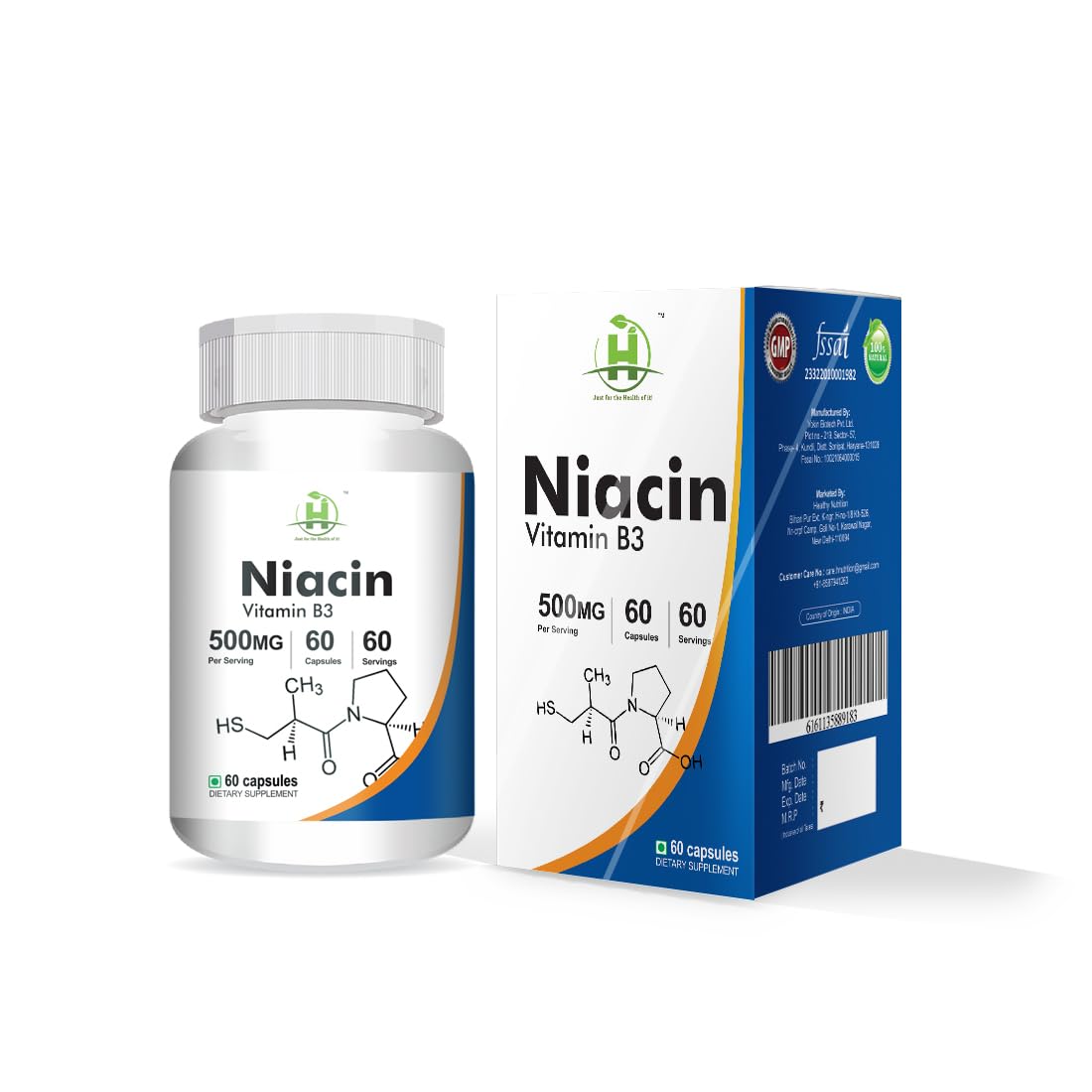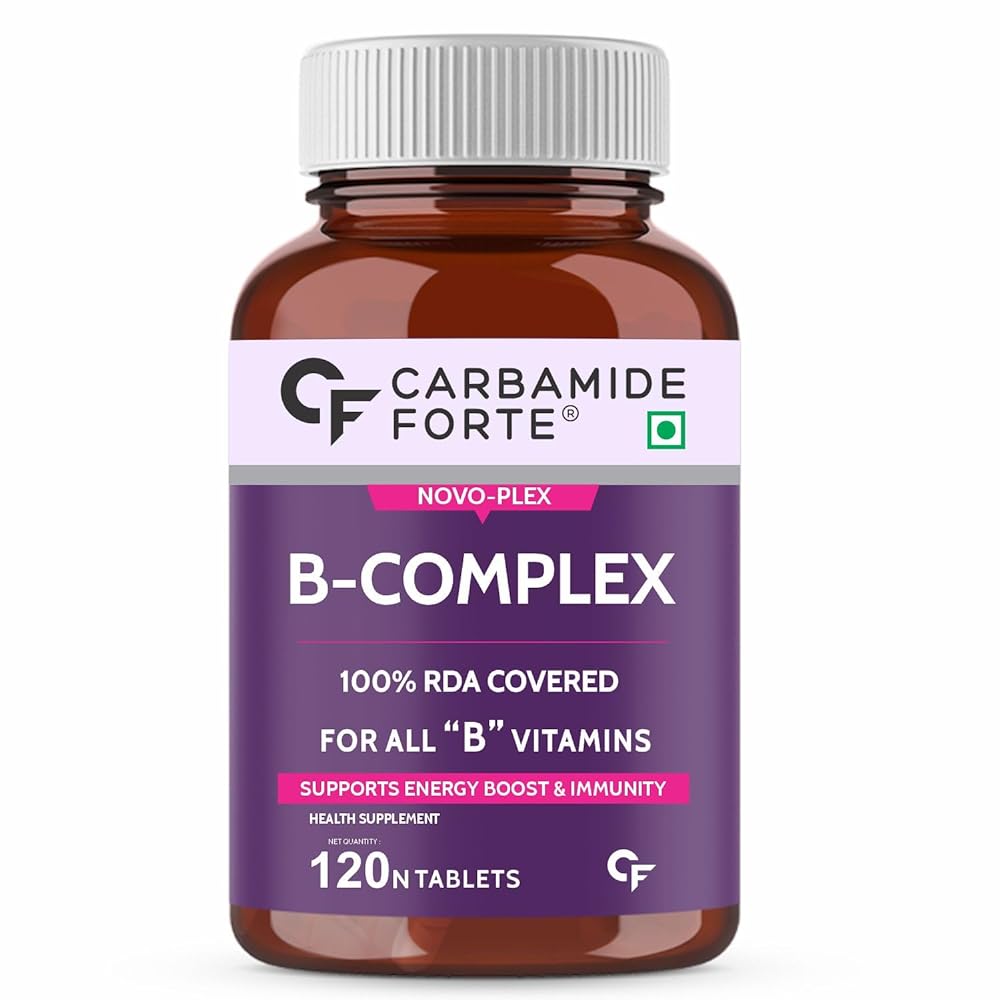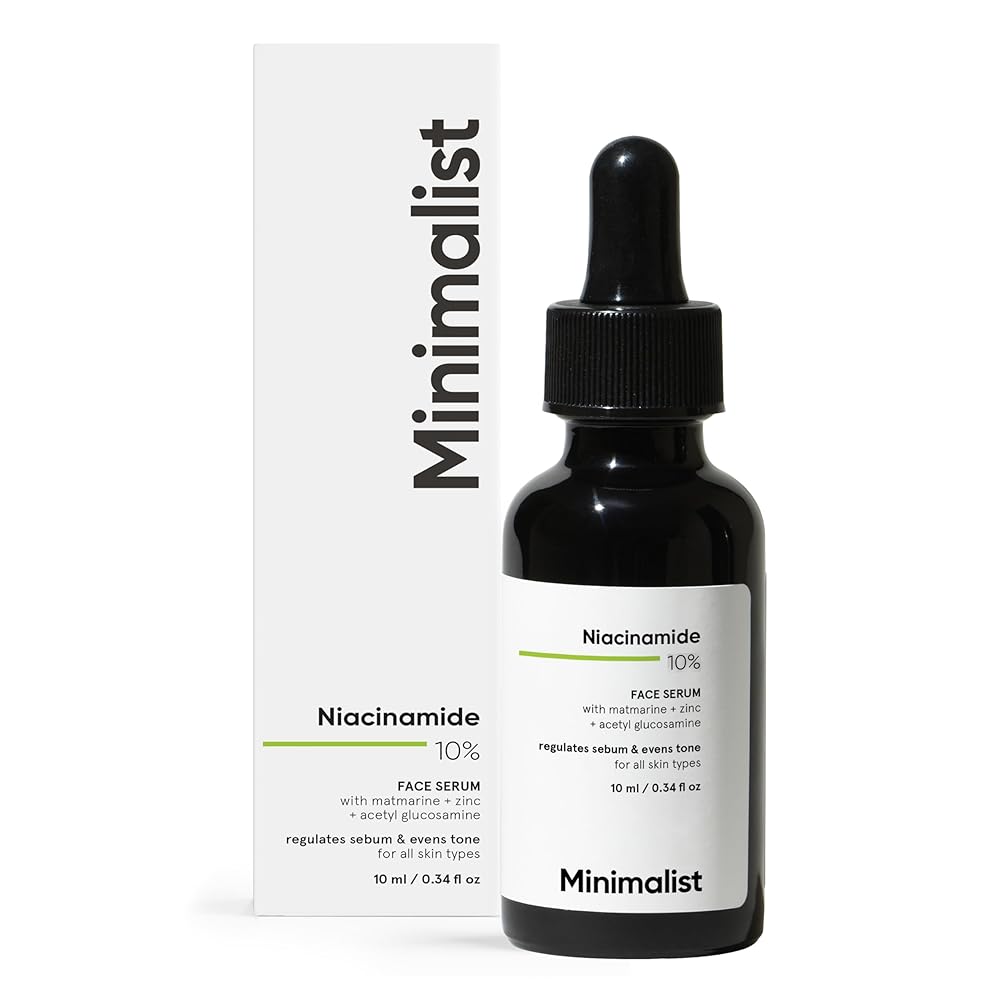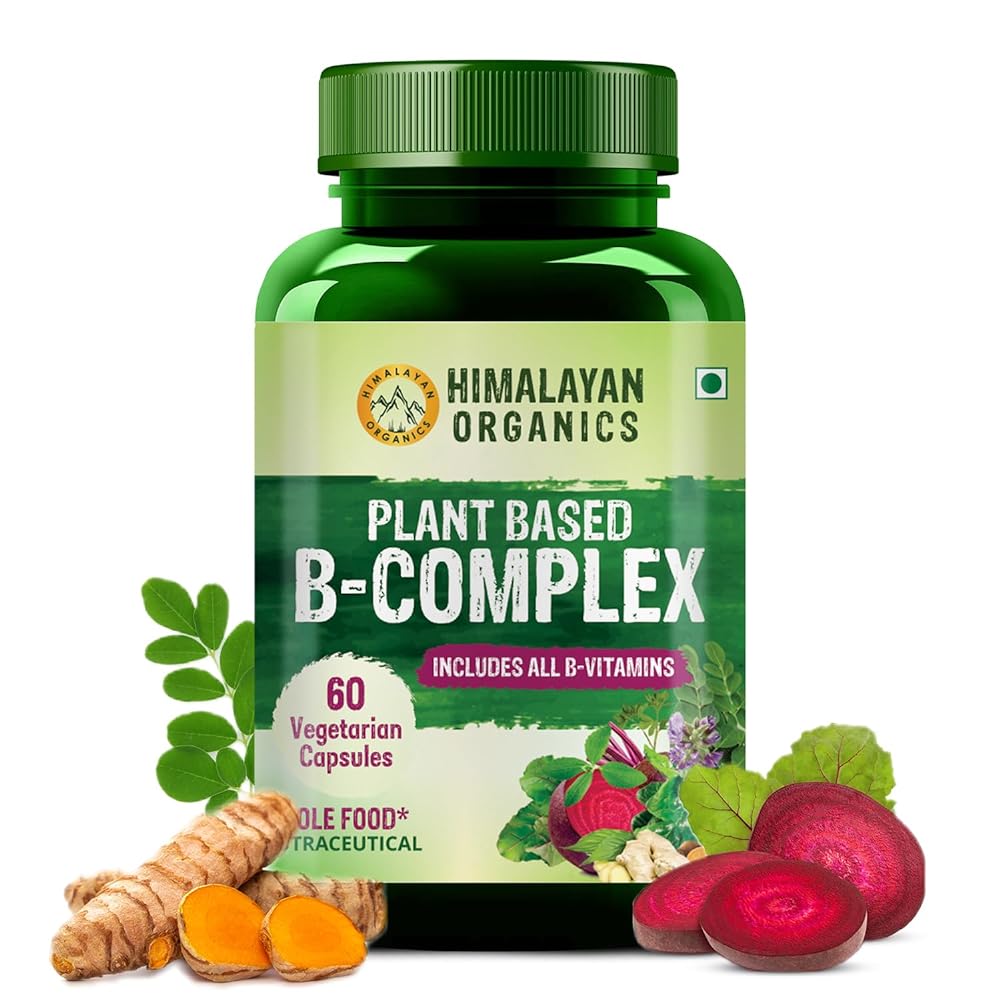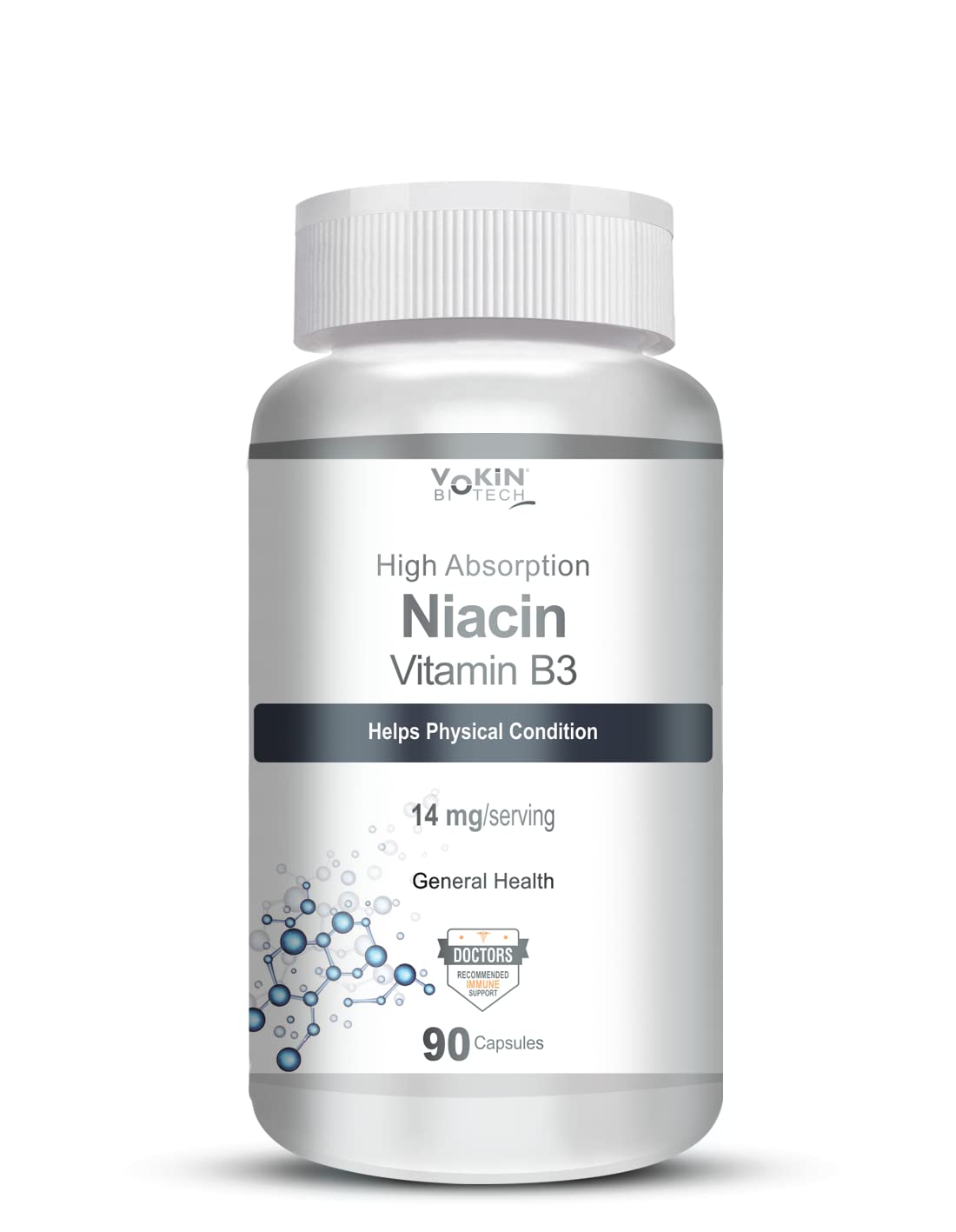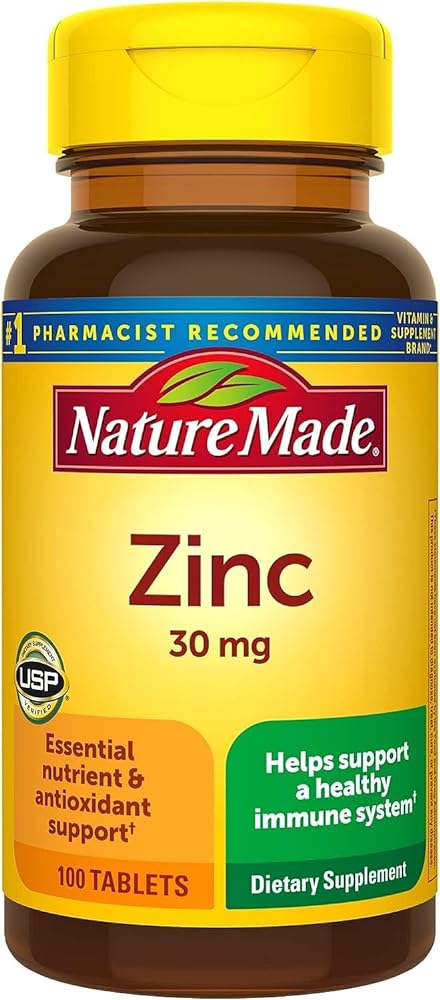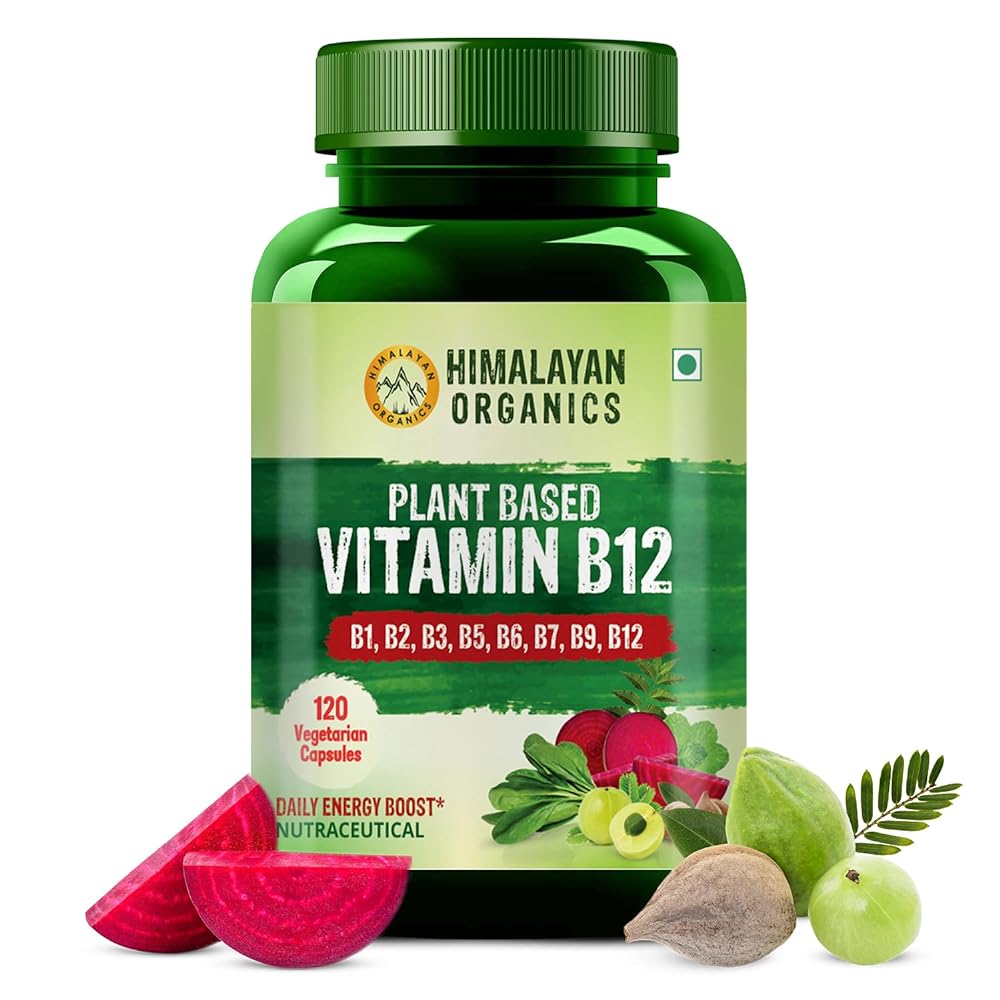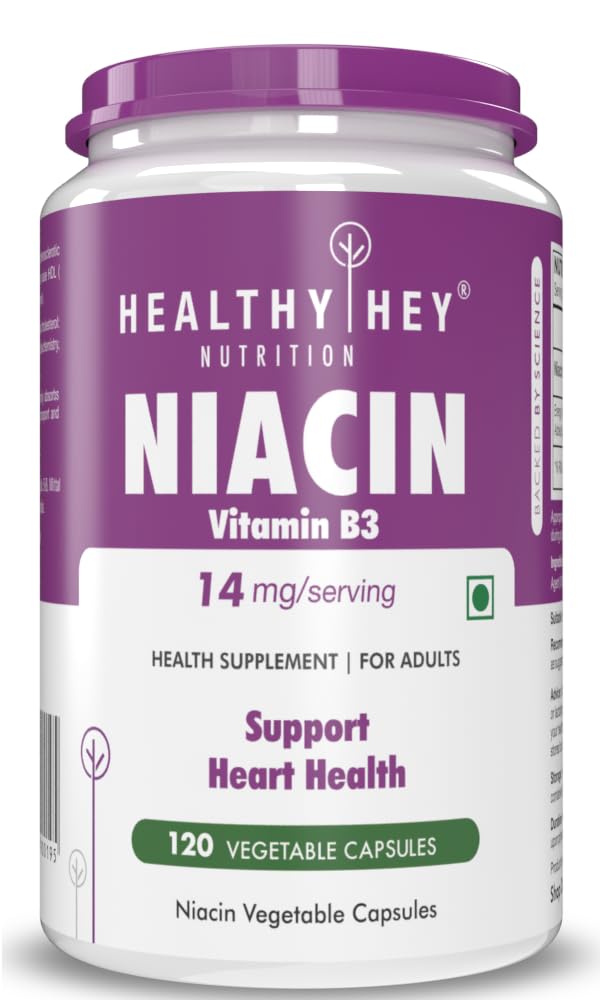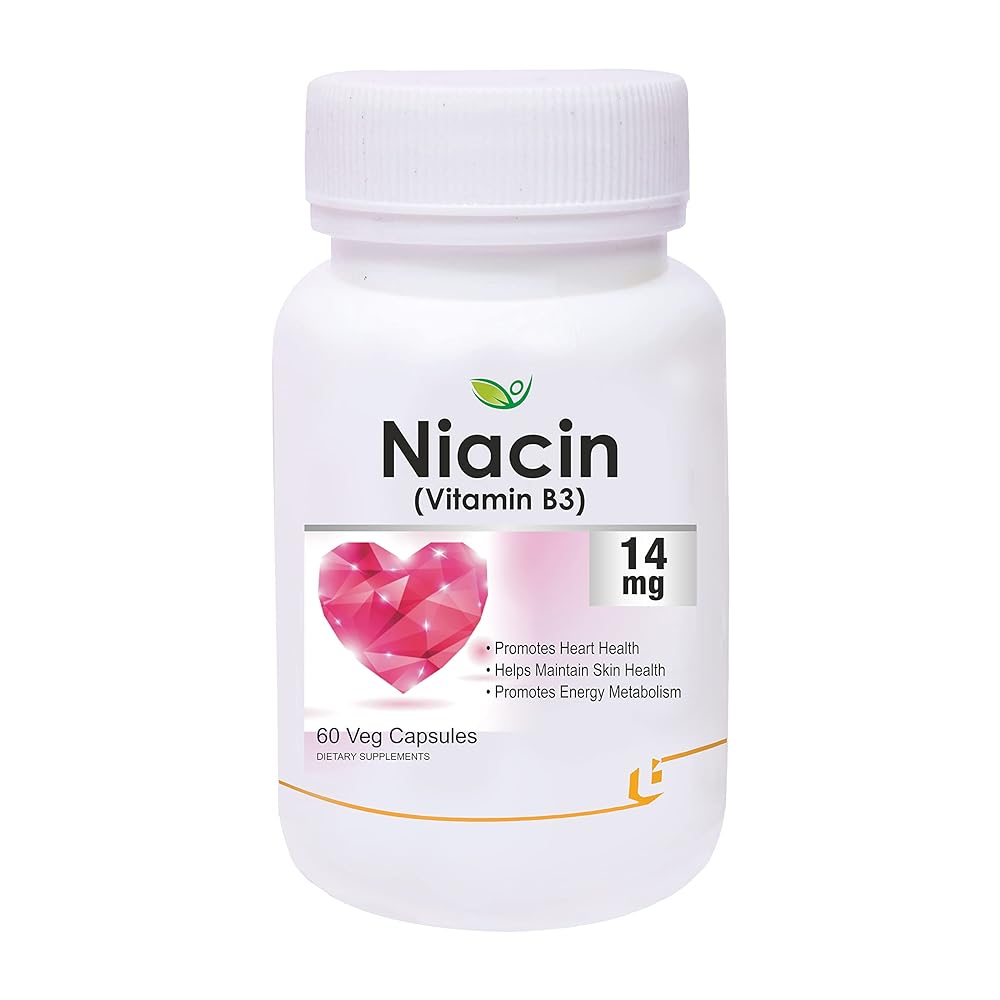Introduction
In the quest for optimal health and well-being, we often find ourselves navigating the world of supplements, vitamins, and minerals, each promising a unique set of benefits. Amidst this vast array of options, Vitamin B3, aka niacin, shines as a true gem. Whether you’re looking to boost your energy levels, support your cardiovascular health, or simply maintain radiant skin, Vitamin B3 has got your back.
Welcome to our comprehensive guide on the “Best Vitamin B3 Supplements in India.” Here, we’ll take you on a journey through the world of this essential nutrient, exploring its various forms, benefits, and how to choose the right supplement for your needs.
Vitamin B3 plays a pivotal role in maintaining our overall health, aiding in processes that range from converting food into energy to promoting proper brain function. But with so many options available, it can be challenging to discern the best way to incorporate this nutrient into your daily routine.
Fear not, for we’re here to unravel the mysteries of Vitamin B3 supplements, from understanding its importance to navigating the different types available. Whether you’re a seasoned supplement enthusiast or a newcomer to the world of vitamins, our guide will equip you with the knowledge you need to make informed choices that support your well-being. So, let’s dive in and discover how Vitamin B3 supplements can help you lead a healthier, more vibrant life.
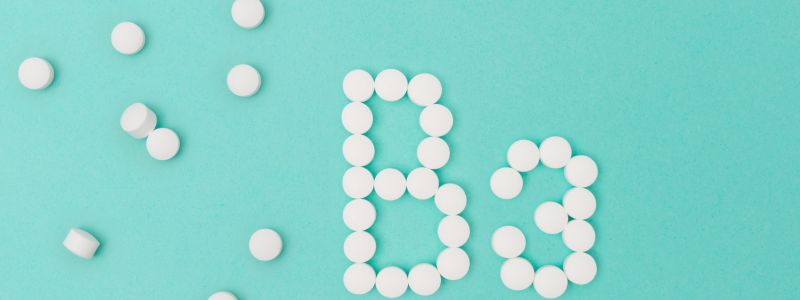
Our pick of the 9 best Niacin Supplements of 2024 in India
Zotezo Score | Best Vitamin B3 Supplements | Lowest Price |
|---|---|---|
|
B+ |
||
|
B+ |
||
|
B |
||
|
B |
||
|
B |
||
|
C+ |
||
|
C+ |
||
|
C+ |
||
|
C+ |
Let's take a deep dive into these 9 best Vitamin B3 Supplements in India
Best Overall Vitamin B3 Supplements in India
Vokin Biotech Pvt. Ltd
B+
Zotezo review
The Healthy Nutrition Niacin (Vitamin B3) 500mg capsules are an essential, non-GMO, and gluten-free supplement that strengthens white blood cells. Users experienced positive results regarding skin treatment and open pores, despite the large capsule size and strong smell.
Product details
Benefits of Niacin 500mg
Drawbacks
Novus Life Sciences Pvt. Ltd.
B+
Zotezo review
The Carbamide Forte Vitamin B-Complex Tablets offer a comprehensive blend of 8 essential B-vitamins, providing 100% RDA for B vitamins and suitable for both men and women. While some users reported experiencing too many changes, one user mentioned experiencing no side effects.
Product details
Benefits of Carbamide Forte B-Complex Tablet...
Weaknesses
Uprising Science Pvt Ltd
B
Zotezo review
The Minimalist 10% Niacinamide Face Serum is a potent solution for oily and acne-prone skin, effectively reducing acne marks and promoting an even skin tone. While the product’s formulation with zinc and 10% niacinamide is beneficial, its small bottle size and potential unsuitability for sensitive skin are notable drawbacks.
Product details
Benefits of BrandName Niacinamide Serum for ...
Disadvantages
Organic Dehydrated Food Pvt. Ltd.
B
Zotezo review
The Himalayan Organics Plant Based Vitamin B Complex provides a plant-based source of essential B vitamins at 100% RDA levels, supporting hair growth, energy levels, and immunity. While effective for many, individuals with severe deficiencies may find the potency insufficient compared to higher dose alternatives.
Product details
Benefits of Himalayan Organics B Complex Cap...
Negatives
Vokin biotech
B
Zotezo review
The Vokin Biotech Niacin Vitamin B3 capsules effectively increase HDL cholesterol, reduce LDL cholesterol, and may help lower blood pressure. However, potential side effects and large capsule size may be a concern for some users.
Product details
Benefits of Vokin B3 Vitamin 90 Capsules
Cons
Nature Made
C+
Zotezo review
Nature Made Zinc, 100 Tablets is a beneficial supplement offering immune support and antioxidant properties. While the 100 tablets per bottle provide a 100-day supply, some users may find the limited quantity and potential aftertaste as drawbacks.
Product details
Benefits of Nature Made Zinc, 100 Tablets
Drawbacks
Organic Dehydrated Food Pvt Ltd
C+
Zotezo review
The Himalayan Organics Plant Based Vitamin B12 Supplement is a potent blend of natural ingredients that promotes vitality, boosts metabolism, and positively impacts immunity by supporting healthy immune cells. Despite potential inconsistent packaging quality, the product offers significant benefits for overall health and well-being.
Product details
Benefits of Himalayan Organics B12 Supplemen...
Weaknesses
HealthyHey Foods LLP
C+
Zotezo review
The HealthyHey Nutrition Niacin Vitamin B3 supplement is an essential product for overall health, supporting healthy cholesterol levels. While lab tested for quality, the lack of recent results for heavy metal toxicity and limited quantity per bottle are notable drawbacks to consider.
Product details
Benefits of HealthyHey Niacin B3 Capsules
Disadvantages
Biotrex Nutraceuticals
C+
Zotezo review
The Biotrex Nutraceuticals Niacin 14mg Vitamin B3 With Inositol 50mg Supplement offers easy-to-swallow capsules that contain Niacin and Inositol for overall health benefits, though some users may find the small size and limited quantity per bottle to be drawbacks.
Product details
Benefits of Biotrex Niacin & Inositol Su...
Negatives
Various types of Vitamin B3
When it comes to choosing the best Vitamin B3 supplement, understanding the different types available is crucial. Vitamin B3, also known as niacin, is a water-soluble vitamin that comes in various forms. Each type has its own unique characteristics, benefits, and considerations. In this guide, we’ll explore the main types of Vitamin B3 supplements to help you make an informed choice.
1. Niacin (Nicotinic Acid):
Niacin, or nicotinic acid, is perhaps the most well-known form of Vitamin B3. It’s valued for its ability to support heart health by improving cholesterol profiles. Niacin is known to raise levels of high-density lipoprotein (HDL) cholesterol, often referred to as the “good” cholesterol, while also lowering levels of low-density lipoprotein (LDL) cholesterol and triglycerides. However, it’s important to note that niacin can cause a side effect known as “flushing,” which involves redness and tingling of the skin. This side effect can be uncomfortable for some individuals.
2. Niacinamide (Nicotinamide):
Niacinamide, also called nicotinamide, is another form of Vitamin B3. Unlike niacin, it doesn’t cause the flushing side effect, making it a more comfortable choice for many people. Niacinamide is often used in skincare products due to its ability to support healthy skin by reducing inflammation and promoting collagen production. It’s also essential for various enzymatic processes in the body and may help manage certain skin conditions, such as acne and rosacea.
3. Inositol Hexanicotinate (IHN):
Inositol hexanicotinate is a compound that combines niacin with inositol, a naturally occurring sugar alcohol. This combination is often marketed as “flush-free” niacin because it is believed to cause less flushing than regular niacin. However, research on its effectiveness for heart health is limited compared to niacin.
4. Nicotinamide Riboside (NR) and Nicotinamide Mononucleotide (NMN):
These are newer forms of Vitamin B3 that have gained attention for their potential anti-aging and cellular health benefits. NR and NMN are precursors to a coenzyme called nicotinamide adenine dinucleotide (NAD+), which plays a crucial role in energy metabolism and cellular repair. While the research on these supplements is still evolving, some studies suggest that they may support healthy aging and mitochondrial function.
5. Dietary Sources:
Let’s not forget that Vitamin B3 can also be obtained through dietary sources. Foods rich in niacin include poultry, fish, lean meats, whole grains, legumes, nuts, and fortified cereals. Incorporating these foods into your diet can be an effective way to meet your Vitamin B3 needs while enjoying a variety of other essential nutrients.
Dietary sources of Vitamin B3
| Food Source | Vitamin B3 Content (mg per 100g) |
|---|---|
| Chicken Breast (cooked) | 16.5 mg |
| Turkey (cooked) | 13.8 mg |
| Salmon (cooked) | 8.5 mg |
| Pork (cooked) | 8.2 mg |
| Tuna (cooked) | 8.0 mg |
| Ground Beef (cooked) | 6.1 mg |
| Mushrooms (cooked) | 5.8 mg |
| Green Peas (cooked) | 2.1 mg |
| Brown Rice (cooked) | 2.1 mg |
| Whole Wheat Bread | 2.0 mg |
| Peanuts | 12.5 mg |
| Sunflower Seeds | 7.0 mg |
| Lentils (cooked) | 2.6 mg |
Tips for choosing the right Niacin Supplements for you
It’s crucial to make informed choices to ensure you’re getting the best Vitamin B3 supplement for your needs. As a registered dietitian, in this comprehensive buyer’s guide, I’ll walk you through the key factors to consider when selecting a Vitamin B3 supplement, helping you make the right decision to support your health and well-being.
1. Understand Your Health Goals:
Before you start shopping for Vitamin B3 supplements, it’s essential to clarify your health goals and reasons for considering supplementation. Are you looking to improve your heart health, support your skin, boost energy levels, or address a specific health condition? Understanding your objectives will guide you in choosing the most suitable form and dosage of Vitamin B3.
2. Types of Vitamin B3 Supplements:
As mentioned earlier, Vitamin B3 comes in various forms, each with its unique characteristics. Here’s a quick recap:
Niacin (Nicotinic Acid): Known for its heart health benefits but may cause flushing.
Niacinamide (Nicotinamide): Suitable for general health support and skincare without the flushing side effect.
Inositol Hexanicotinate (IHN): Marketed as “flush-free” niacin but has limited research for heart health.
Nicotinamide Riboside (NR) and Nicotinamide Mononucleotide (NMN): Emerging options with potential anti-aging and cellular health benefits.
Consider your specific needs and preferences when choosing the type of Vitamin B3 supplement that aligns with your goals.
3. Dosage Considerations:
Vitamin B3 requirements vary depending on age, sex, pregnancy status, and overall health. Here’s a general guideline for daily dosages:
- Infants: 2-6 mg
- Children: 6-16 mg
- Adolescents and Adults: 14-20 mg (males), 14-18 mg (females)
- Pregnant and breastfeeding women may have slightly higher requirements.
Keep in mind that individual needs can vary, so it’s advisable to consult with a registered dietitian for personalized dosage recommendations.
4. Quality and Brand Reputation:
The supplement market is flooded with products of varying quality. To ensure you’re getting a safe and effective Vitamin B3 supplement, look for reputable brands that adhere to high manufacturing standards. Consider choosing supplements that have undergone third-party testing for quality and purity.
5. Formulation and Ingredients:
Examine the supplement’s formulation and ingredient list carefully. Look for products with minimal additives, fillers, or artificial preservatives. Ideally, the supplement should contain the specific form of Vitamin B3 that aligns with your goals (e.g., niacin, niacinamide, or others).
6. Bioavailability:
Bioavailability refers to the body’s ability to absorb and utilize a nutrient effectively. Some forms of Vitamin B3 may have higher bioavailability than others. For example, niacinamide is well-absorbed, while other forms may be less so. If absorption efficiency is a concern for you, consult with a healthcare professional for guidance on the best form to choose.
7. Dosage Form:
Vitamin B3 supplements come in various dosage forms, including capsules, tablets, powders, and creams. Consider your personal preferences and any specific dietary restrictions when selecting a dosage form. For example, if you have difficulty swallowing pills, a powder or liquid form might be more suitable.
8. Allergen Information:
If you have allergies or sensitivities to certain ingredients, such as gluten, soy, or dairy, be sure to check the supplement’s allergen information. Many reputable brands offer allergen-free options to accommodate various dietary restrictions.
9. Certification and Testing:
Look for supplements that carry certifications from organizations like the United States Pharmacopeia (USP) or NSF International. These certifications indicate that the product has met stringent quality and purity standards. Additionally, some supplements undergo testing for heavy metals, contaminants, and potency, providing an extra layer of assurance.
10. Price and Value:
While cost should be a consideration, don’t let it be the sole determining factor. High-quality supplements may come with a slightly higher price tag, but they often provide better value in terms of effectiveness and safety. Consider the cost per serving when evaluating the overall value.
Products listed here are carefully reviewed and tested by our expert authors and reviewers. If you buy through links on this page, we may earn a small commission. Here’s our editorial process.
How we reviewed these products
Advantages of using Niacin Supplements
When it comes to supporting your overall health and well-being, few nutrients can rival the impressive range of benefits offered by Vitamin B3, also known as niacin. In this in-depth exploration of the advantages of Vitamin B3 supplements, we’ll delve into the myriad ways in which this essential nutrient can enhance your life.
1. Energize Your Body and Mind:
Vitamin B3 is a key player in the process of converting food into energy. It helps break down carbohydrates, fats, and proteins, ensuring that your body has a steady supply of fuel. This means more pep in your step and improved mental clarity. If you’ve ever felt fatigued or mentally foggy, a deficiency in Vitamin B3 might be the culprit. Supplementing with the right form of Vitamin B3 can help replenish your energy stores and keep your mind sharp.
2. Support Cardiovascular Health:
Maintaining a healthy heart is paramount, and Vitamin B3 can be your ally in this endeavor. Niacin has been shown to boost levels of high-density lipoprotein (HDL) cholesterol, often referred to as the “good” cholesterol. It also helps lower levels of low-density lipoprotein (LDL) cholesterol and triglycerides, two factors associated with heart disease. By improving your lipid profile, Vitamin B3 supplements can contribute to a healthier cardiovascular system.
3. Manage Cholesterol Levels:
High cholesterol levels are a concern for many, but Vitamin B3 can come to the rescue. Niacin supplements, when used under the guidance of a healthcare professional, have been found to be effective in lowering LDL cholesterol and triglycerides. Additionally, niacin can increase the size of LDL particles, making them less likely to contribute to arterial plaque buildup. However, it’s crucial to consult with a healthcare provider before using niacin for cholesterol management, as high doses can lead to side effects.
4. Promote Skin Health:
Say goodbye to dry, irritated skin with the help of Vitamin B3. Niacinamide, a form of Vitamin B3, is a common ingredient in skincare products. It has been shown to support skin health by reducing inflammation, improving the skin’s barrier function, and even reducing the appearance of fine lines and wrinkles. Whether you’re dealing with acne, rosacea, or simply want to maintain a radiant complexion, Vitamin B3 can be your secret weapon.
5. Enhance Brain Function:
Your brain relies on a constant supply of energy, and Vitamin B3 plays a crucial role in providing it. By supporting efficient energy production in brain cells, niacin can enhance cognitive function, memory, and concentration. Some research also suggests that niacin may help protect against age-related cognitive decline, offering hope for maintaining mental sharpness as you age.
6. Manage Diabetes:
If you’re living with diabetes or at risk of developing it, Vitamin B3 may offer some relief. Niacin has been shown to improve insulin sensitivity, which can help regulate blood sugar levels. Additionally, it may reduce the risk of diabetic complications by supporting heart health and lowering triglyceride levels. However, it’s essential to work closely with a healthcare provider to determine the right approach to using niacin for diabetes management.
7. Alleviate Arthritis Symptoms:
Arthritis can be a painful and debilitating condition, but Vitamin B3 might offer some relief. Niacinamide, a form of Vitamin B3, has anti-inflammatory properties that can help reduce joint inflammation and alleviate pain associated with arthritis. While it’s not a standalone treatment, it can complement other therapies and lifestyle modifications in managing arthritis symptoms.
8. Boost Digestive Health:
A healthy digestive system is the cornerstone of overall well-being, and Vitamin B3 plays a role here too. Niacin aids in the production of digestive enzymes that break down food, allowing for better nutrient absorption. It can also help maintain the health of the mucous membranes lining the digestive tract, potentially reducing the risk of gastrointestinal issues.
9. Support Skin Conditions:
Beyond its cosmetic benefits, Vitamin B3 can be a savior for those dealing with skin conditions like eczema and psoriasis. Niacinamide’s anti-inflammatory properties can help soothe irritated skin, reduce redness, and alleviate itching. It may also assist in repairing the skin’s natural barrier, preventing future flare-ups.
10. Improve Blood Circulation:
Adequate blood circulation is essential for delivering oxygen and nutrients to your body’s tissues. Vitamin B3 has a vasodilating effect, which means it widens blood vessels, promoting better blood flow. This can be particularly beneficial for individuals with conditions like Raynaud’s disease or those looking to improve exercise performance and recovery.
11. Manage Migraines:
Migraine headaches can be excruciating, but Vitamin B3 may offer some relief. Niacin has been explored as a potential treatment for migraines, with some individuals reporting reduced frequency and severity of attacks. However, it’s important to note that not everyone responds the same way, so consulting with a healthcare professional is essential.
12. Support Detoxification:
The liver plays a vital role in detoxifying the body, and Vitamin B3 is integral to its function. Niacin helps the liver metabolize toxins and drugs, ensuring they can be safely eliminated from your system. This detoxifying action may be particularly beneficial for individuals who have been exposed to environmental toxins or are on certain medications.
Disdvantages of using Vitamin B3 Supplements
While niacin, offers a multitude of health benefits, it’s essential to be aware of potential side effects when considering supplementation. Like any nutrient, the key to reaping the rewards of Vitamin B3 lies in moderation and informed choices. Here, we’ll delve into the possible side effects to help you make the best decisions for your health.
1. Flushing and Skin Reactions:
One of the most commonly reported side effects of niacin supplements is flushing, which is characterized by a warm, tingling sensation and redness of the skin, particularly on the face and upper body. This occurs because niacin causes blood vessels to dilate, resulting in increased blood flow near the skin’s surface. While flushing is usually harmless, it can be uncomfortable. However, it’s often a transient side effect that diminishes with continued use.
2. Gastrointestinal Distress:
Some individuals may experience digestive discomfort when taking niacin supplements, including nausea, diarrhea vomiting, and abdominal pain. These symptoms are typically mild and can often be mitigated by taking niacin with food or choosing a different form of Vitamin B3, such as niacinamide, which is less likely to cause digestive issues.
3. Liver Concerns:
In rare cases, high doses of niacin supplements, especially sustained-release formulations, have been associated with liver toxicity. This can manifest as elevated liver enzymes and potential liver damage. To minimize this risk, it’s crucial to consult with a healthcare professional before taking high-dose niacin supplements, especially if you have preexisting liver conditions.
4. High Blood Sugar:
Niacin can raise blood sugar levels, which may be concerning for individuals with diabetes. If you have diabetes, work closely with your healthcare provider to monitor your blood sugar levels while taking niacin supplements. Adjustments to your diabetes management plan may be necessary.
5. Increased Uric Acid Levels:
Niacin can lead to elevated levels of uric acid in the blood, which may exacerbate conditions like gout. If you have a history of gout or high uric acid levels, it’s crucial to discuss the use of niacin supplements with your healthcare provider to weigh the potential risks and benefits.
6. Allergic Reactions:
While rare, some individuals may experience allergic reactions to niacin supplements, leading to symptoms like rash, itching, swelling, and difficulty breathing. If you suspect an allergic reaction, discontinue use immediately and seek medical attention.
7. Interactions with Medications:
Niacin can interact with certain medications, including blood thinners, blood pressure medications, and cholesterol-lowering drugs. These interactions can amplify the effects of these medications or lead to adverse effects. Always inform your healthcare provider about any supplements you’re taking to ensure safe and effective treatment.
Who should use Niacin Supplements
Niacin is a vital nutrient that plays a crucial role in maintaining overall health and well-being. While many people can meet their Vitamin B3 needs through a balanced diet, certain individuals may benefit from supplementation to address specific health concerns or deficiencies. In this comprehensive guide, we’ll explore the target audiences who should consider Vitamin B3 supplements and the benefits they can expect from different types of supplementation.
1. Individuals with Heart Health Concerns:
Recommended Form: Niacin (Nicotinic Acid)
Niacin is well-known for its ability to support heart health by improving cholesterol profiles. If you have high levels of low-density lipoprotein (LDL) cholesterol and triglycerides or low levels of high-density lipoprotein (HDL) cholesterol, niacin supplementation may be a suitable option. Niacin has been shown to increase HDL cholesterol, often referred to as the “good” cholesterol, while lowering LDL cholesterol and triglyceride levels. However, it’s essential to use niacin supplements under the guidance of a healthcare provider, as high doses can lead to side effects like flushing.
2. Individuals Seeking Skin Health Benefits:
Recommended Form: Niacinamide (Nicotinamide)
Niacinamide, a form of Vitamin B3, has gained popularity in the skincare industry for its remarkable skin health benefits. It can help reduce inflammation, promote collagen production, and improve the skin’s barrier function. If you’re looking to address skin concerns like acne, rosacea, fine lines, or wrinkles, niacinamide-based skincare products or supplements may be beneficial. These supplements typically do not cause the flushing side effect associated with niacin.
3. Those with Energy and Brain Function Goals:
Recommended Form: Niacin or Niacinamide
Vitamin B3 plays a vital role in energy metabolism and brain function. If you often experience fatigue or mental fog, a Vitamin B3 supplement can help support these aspects of your health. Niacin and niacinamide both contribute to efficient energy production in the body and can enhance cognitive function, memory, and concentration. Supplementing with Vitamin B3 may be particularly beneficial for individuals with busy lifestyles or those looking to maintain mental sharpness as they age.
4. Individuals Managing Diabetes:
Recommended Form: Niacin or Niacinamide
Vitamin B3 can aid in managing blood sugar levels, making it a potential ally for individuals with diabetes or those at risk of developing the condition. Niacin and niacinamide have been shown to improve insulin sensitivity, which can help regulate blood glucose levels. However, it’s crucial to work closely with a healthcare provider to determine the right approach to using Vitamin B3 for diabetes management and to monitor your progress.
5. Individuals with Skin Conditions:
Recommended Form: Niacinamide (Nicotinamide)
If you’re dealing with skin conditions like eczema or psoriasis, niacinamide may offer relief. Its anti-inflammatory properties can help soothe irritated skin, reduce redness, and alleviate itching. Niacinamide may also assist in repairing the skin’s natural barrier, preventing future flare-ups. Incorporating niacinamide-based skincare products into your routine may complement other treatments recommended by your dermatologist.
6. Those Looking to Support Digestive Health:
Recommended Form: Niacin or Niacinamide
Vitamin B3 aids in the production of digestive enzymes and supports the health of the mucous membranes lining the digestive tract. If you have gastrointestinal concerns or wish to optimize your digestive health, Vitamin B3 supplements may be part of a holistic approach. Always consult with a healthcare provider to address specific digestive issues and explore appropriate supplementation.
7. Individuals with Migraine Concerns:
Recommended Form: Niacin or Niacinamide
Some people have reported relief from migraines with niacin supplements. While research on this topic is ongoing, niacin’s potential to reduce the frequency and severity of migraines has intrigued many. If you’re a migraine sufferer, it’s worth discussing the use of Vitamin B3 supplements with your healthcare provider to explore if it’s a suitable option for you.
8. Those Interested in Anti-Aging and Cellular Health:
Recommended Form: Nicotinamide Riboside (NR) or Nicotinamide Mononucleotide (NMN)
Emerging forms of Vitamin B3, such as NR and NMN, have gained attention for their potential anti-aging and cellular health benefits. These supplements are believed to support the production of nicotinamide adenine dinucleotide (NAD+), a coenzyme involved in various cellular processes. While the research is still evolving, NR and NMN may offer promise for individuals interested in maintaining overall health and vitality as they age.
Recommended Dosage of Vitamin B3 Supplements
| Age Group | Recommended Daily Allowance (RDA) |
|---|---|
| Infants (0-6 months) | 2-4 mg |
| Infants (7-12 months) | 4-6 mg |
| Children (1-3 years) | 6-8 mg |
| Children (4-8 years) | 8-12 mg |
| Children (9-13 years) | 12-16 mg |
| Adolescents (14-18 years) | 16-18 mg (males), 14-16 mg (females) |
| Adults (19+ years) | 16-20 mg (males), 14-18 mg (females) |
| Pregnant Women | 18-20 mg |
| Breastfeeding Women | 17-18 mg |
Understand the who, what & why behind your favourite products
Brand Values | Product Philosophy | Product USPs
Read brand stories, their raison-d'etre, and understand what drives them to caringly create the highest quality products for your well-being.
Brand stories
Frequently asked questions on Niacin Supplements
1. What is Vitamin B3, and why is it important?
2. Can I get enough Vitamin B3 from my diet alone?
3. What are the different forms of Vitamin B3 supplements, and how do they differ?
4. Are Vitamin B3 supplements safe to use?
5. What are the potential side effects of Vitamin B3 supplements?
6. What is the recommended dosage for Vitamin B3 supplements?
7. Are Vitamin B3 supplements regulated, and how can I ensure their quality?
Expert reviews you can rely upon
Expert Insights | Product Reviews | Connect with Experts
Gain valuable insights and read unbiased product reviews by subject matter Experts on Zotezo, the ultimate trust commerce platform, that empowers millions globally to make informed decisions for their wellbeing.
Expert Advisory
Conclusion
Whether you’re seeking to address specific health concerns or simply looking to optimize your overall wellness, Vitamin B3 supplements can play a role in your journey. The choice of the best type, dosage, and formulation should always be made in consultation with a healthcare provider or registered dietitian who can provide personalized guidance.
Moreover, while supplements are valuable, they should never replace a balanced diet rich in whole foods. Consider Vitamin B3 supplements as complementary tools to support your health, alongside a nutritious diet and a healthy lifestyle.
We hope this guide has empowered you with knowledge and insights to make informed decisions about Vitamin B3 supplementation. Your feedback is important to us. If you found this information helpful or have any questions or suggestions, please feel free to share your thoughts. Your input will help us continue to provide valuable guidance on your journey to optimal health.

